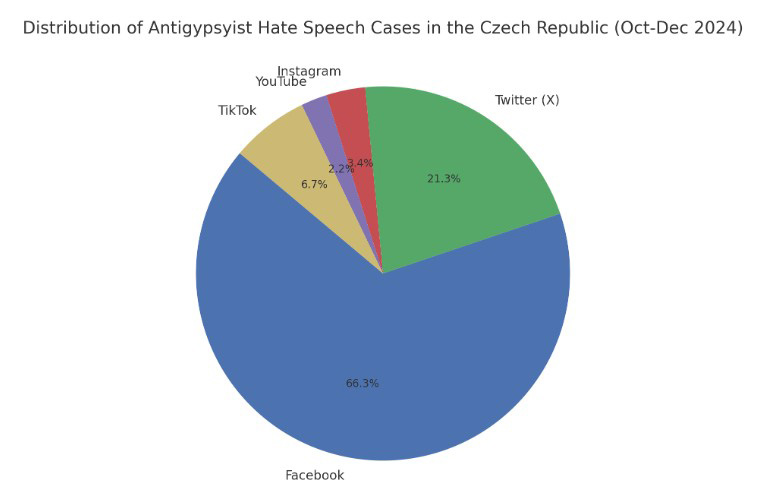A recent monitoring report from the TAAO project has revealed the scale of antigypsyist hate speech in Czechia’s digital space. Between October and December 2024, monitors recorded 159 cases of online hate speech targeting Roma communities. The findings indicate that harmful stereotypes and dehumanising rhetoric are deeply embedded in social media platforms, with little action taken to curb their spread.

Social media: A primary source of hate speech
The research, conducted by Romea o.p.s, analysed online content across different platforms and found that antigypsyist narratives were present on:
- Facebook – 59 cases from personal/private accounts.
- X (former Twitter) – 19 cases, including content from public figures.
- Instagram – 1 case from a private account and 2 cases from social media influencers.
- YouTube – 1 case from a private account and 1 from a public figure.
- TikTok – 2 cases from personal accounts and 4 from influencers.
These platforms continue to serve as a breeding ground for hate speech, allowing negative stereotypes about Roma to circulate widely.

The most common themes of online hate
The report identified several recurring themes in antigypsyist hate speech in Czechia:
- Criminality – Roma communities were frequently accused of being inherently linked to crime. Hate speech on this topic appeared in 41 cases with a highly negative framing.
- Social issues (housing, welfare, poverty, immigration) – 33 cases contained narratives blaming Roma for social problems, often suggesting they are a burden on public resources.
- Education – 54 cases contained negative or neutral discussions about Roma children’s schooling, often implying a lack of integration.
- Health and sanitation – 59 cases focused on Roma access to healthcare, frequently portraying Roma as a public health risk.
- Politics and representation – 65 cases included negative content about Roma political participation and civil rights activism.
These narratives reinforce stereotypes that further marginalise Roma communities in public life.
Case study: Instagram post by @czechske reaches 2.9 million views
One of the most viral antigypsyist posts documented during the monitoring period was an Instagram post by the user @czechske on October 15, 2024. The post, captioned "How I wake up knowing I’m not a gypsy," mocked Roma identity and attracted thousands of likes and comments, many of which contained aggressive, mocking, and dehumanising language.
Engagement Metrics of the Post:
- Views: 2.9 million
- Comments: 1,227 (with many supporting antigypsyist narratives)
- Popular comments:
- “Bro finally managed to unite Eastern Europe, and they say it couldn’t be done.” (6,224 likes)
- “The only thing Europeans can agree on is their opinion on gypsies.” (2,871 likes)
- “How can gypsy people live with themselves?” (1,345 likes)
Despite multiple reports from users, Instagram refused to remove the post, stating that it did not violate community guidelines.
A monitor who reported the post on December 4, 2024, described their frustration:
“This post spreads harmful stereotypes, ridicules Roma, and encourages a hateful environment. Instagram refused to take it down, claiming it doesn’t violate community guidelines. This kind of inaction normalizes hate and emboldens others to spread similar content.”
Mockery, violence, and the failure of platform moderation
The intensity of antigypsyist hate speech in Czechia varied, with a significant portion of posts containing strong or extreme hate speech:
- Crude epithets appeared in 88 cases, with 30 classified as extremely strong.
- Mockery and sarcasm were present in 87 cases, often used to ridicule Roma individuals and organisations.
- Appeals to violence, including suggestions of physical harm, were identified in 86 cases.
- Race supremacy rhetoric, often disguised in coded language, appeared in 53 cases.
Despite the widespread presence of hate speech, social media platforms largely failed to take action. While monitors reported some posts, most remained online, with platforms either not responding or determining that the content did not violate their guidelines.
The need for stronger action
The findings from the Czechia highlight a clear failure of platform moderation and the normalisation of antigypsyist hate speech in online spaces. Without stronger enforcement of content moderation policies, Roma communities will continue to face discrimination and digital exclusion.
Key steps needed to address the issue:
- Social media accountability – Platforms must consistently apply hate speech policies and remove antigypsyist content.
- Stronger hate speech regulations – Czech authorities must take steps to criminalise digital hate speech targeting Roma.
- Public awareness campaigns – Greater education is needed to challenge harmful stereotypes and promote positive representation of Roma communities.
As the TAAO project continues its monitoring efforts, it is clear that urgent action is needed to combat online antigypsyism in Czechia. Without intervention, social media will remain a space where hate speech against Roma is tolerated and amplified.
Share on Facebook Post on Twitter





